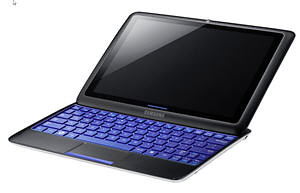CES: Samsung TX100 - a new category of mobile PC

Samsung claims to have come up with a new category of mobile PC with its TX100. At first glance it looks like an ultra thin notebook, but in fact, says Samsung, it brings the benefits of a light and compact Tablet PC together with easy typing and enhanced productivity.
How is this achieved?
Via a very light, thin and innovative overall design incorporating a 10.1-inch multi touch LCD display with 1366 x 768 pixels that functions very much like a Tablet PC.

The keyboard slides out from under the screen much as keyboards slide out from some smartphones, and you can then raise the TX100’s screen so that it sits like a standard notebook.
We don’t know what the TX100 measures, or how much it weighs, but it does look extremely portable and neat. Connection ports include USB, HDMI, microSD card slot and Wi-Fi. Data is stored on a solid state drive. The TX100 runs Intel’s latest Atom processor and Samsung says the battery life is up to nine hours. The device is DLNA compliant so wire-free file sharing is easy between other compliant devices.
Samsung includes its own applications for music, video, photo management, note taking, weather reports, time management and navigation. These are finger friendly and complement Windows 7 Professional.
Samsung says the TX100 is suitable for everyone from students to mobile workers, though the specifications suggest it is better suited to light office tasks than everyday business computing.
There will be two models of the TX100 with 32GB and 64GB of storage, and they will be available from March. There is no word yet on whether the UK is among the selected markets for launch.
Sandra Vogel